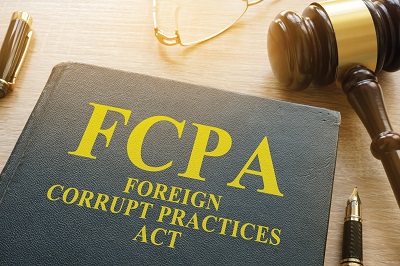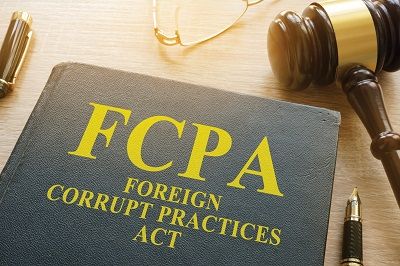“Tone at the top” now includes ensuring business dealings are ethical and bribe-free.
The impact of the Foreign Corrupt Practices Act (FCPA) on corporations and their boards of directors has been enormous and wide-ranging, and not just on corporations based in the United States. Companies all over the world have modified their business practices to avoid violating the FCPA and becoming ensnared in legal enforcement by the Securities and Exchange Commission (SEC) or the Department of Justice (DOJ).
An investigation by the SEC in the early 1970s found that more than 400 U.S. corporations admitted to making questionable payments totaling more than $300 million to foreign government officials, foreign political parties or foreign politicians (often running for office). This was not illegal at the time, so the legislature set out to make it illegal.
 At its core, the FCPA prohibits individuals and entities from bribing foreign government officials anywhere in the world to benefit their own business interests. A bribe is defined as anything “of value” so is not limited to cash payments or other financial transfers. Originally enacted in 1977, the FCPA was amended in 1998 to also apply to foreign individuals or companies that, either directly or through third parties, facilitate or make corrupt payments on U.S. territory.
At its core, the FCPA prohibits individuals and entities from bribing foreign government officials anywhere in the world to benefit their own business interests. A bribe is defined as anything “of value” so is not limited to cash payments or other financial transfers. Originally enacted in 1977, the FCPA was amended in 1998 to also apply to foreign individuals or companies that, either directly or through third parties, facilitate or make corrupt payments on U.S. territory. Importantly, any domestic or foreign corporation that has a class of securities registered, or is required to file reports, under the Securities and Exchange Act of 1934 is subject to FCPA enforcement. The SEC and DOJ made clear that they intended to prosecute individuals, and the personal engagement of directors in the oversight of a corporation's compliance program increased significantly. It is not acceptable for a board to simply rely on management's assurances that the appropriate anti-bribery policies and procedures are in place. The effectiveness of a corporation's measures must be tested and verified by the board on a continual basis, and this must be documented.
‘Bananagate' and slush funds
One prominent example of the conduct that spurred the FCPA was known as “Bananagate.” In 1974, the country of Honduras passed a law that doubled the tax on banana exports. Chiquita, then known as United Brands Company, sourced almost a quarter of its bananas from Honduras. The following year, the chairman and president of the company, Eli Black, committed suicide by jumping from the 44th floor of what was then known as the Pan Am Building in New York. A government investigation of his death uncovered that his company had paid a $2.5 million bribe to the president of Honduras, depositing the funds in a Swiss bank account. After the bribe was paid, the tax on banana exports was reduced by half. While it was not illegal for U.S. companies to bribe foreign officials, it was illegal to hide such bribes from shareholders.
It became clear that many corporations used secret slush funds to make political contributions and that these largely were not reflected or reported in their SEC filings. There was concern on Capitol Hill that this level of foreign bribery had a negative impact on America's image abroad and that it did not align with the country's foreign policy framework. The FCPA was enacted by Congress in part to restore public confidence in the integrity of the way business is conducted in the United States.
It is perhaps ironic that some of the earliest and most significant enforcement actions under the FCPA targeted foreign corporations (e.g., Siemens, Alstom, ÂVimpelCom), while the “top 10” list of financial penalties now includes only one American corporation, Goldman Sachs, which paid $3.3 billion in penalties to resolve FCPA charges in relation to Malaysia's sovereign wealth fund in 2020. All in all, the U.S. government has assessed financial penalties of more than $20 billion since the legislation's inception in 1977.
Compliance starts at the top
From the perspective of a corporate board, FCPA compliance starts at the top. Directors must encourage and incentivize a culture with high ethical standards and must create and follow corporate policies and procedures to ensure compliance with all applicable laws, including the FCPA. What does this mean in practice? It means, for example, that directors should monitor whether the CEO's routine communications to employees regularly highlight the company's standards of ethical conduct. It also means that directors should set a positive example in their own personal conduct and encourage the CEO and senior executives to do so as well.
Here is a good example. Several years ago, a high-profile CEO traveled on a corporate aircraft to a country where government corruption is quite common. During landing, a part on the aircraft malfunctioned and a replacement part had to be shipped in. When the CEO was ready to depart two days later, it became clear that the replacement part had been held up by customs authorities. It was communicated to the aircraft crew that a cash payment would result in the immediate release of the part. Upon learning this, the CEO immediately made arrangements to depart on a commercial flight, at great inconvenience to his schedule. While never shared publicly, this story was widely shared within the company and had a positive effect on its culture.
But there is much more that the board must do and that individual directors must do. It is essential that boards stay fully informed on all developments that might affect FCPA compliance. This includes personnel moves in international operations and foreign subsidiaries, M&A activity, changes in local laws or regulations and potential issues that may recently have arisen in the industry. Directors must take a real interest in understanding how the company's compliance program functions in practice, what the weaknesses are and what management is doing to address them. At corporations active in high-risk industries (e.g., oil and gas, mining) or with operations in high-risk countries, anti-corruption policies and procedures should be reviewed and discussed regularly and certainly not just once annually.
Corporate directors must lead the way by personally participating in FCPA training sessions, by educating themselves outside the boardroom and by demonstrating their deep commitment to a proactive culture of compliance.
Enforcement measures
For almost two decades after its enactment in 1977, there was only sporadic enforcement of the new law, and the United States largely stood alone in attempting to exemplify strong ethical core values in international business relations. In 1994 the Organization for Economic Co-Operation and Development (OECD) agreed to take “concrete measures … to combat bribery of foreign officials,” and in 1997 the Convention on Combating Bribery of Foreign Public Officials in International Business Transactions was completed. The U.K. passed its even broader scoped Bribery Act in 2010.
While enforcement of the FCPA increased significantly over the past 20 years, with many prominent cases that have received widespread public attention, it is difficult to say conclusively that corruption has in fact been reduced. This is partly because corruption is notoriously difficult to measure. One of the most comprehensive studies (by Grant Nicholas Margeson at the University of Texas at Austin in 2014) taking an in-depth look at the impact of FCPA enforcement actions in Mexico, Venezuela, Thailand, Nigeria, Kazakhstan, Indonesia, India, China, Brazil and Argentina “was unable to find that FCPA enforcement action has reduced corruption levels in those targeted countries.”
That said, a law's “success” may come down to one's definition of success. There is no question that the FCPA has had a significant — and positive — impact on the ways that international corporations conduct themselves and has discouraged unethical behavior at many corporations, all while creating a heightened awareness in boardrooms around the world for taking responsibility to prevent and monitor illegal conduct.



